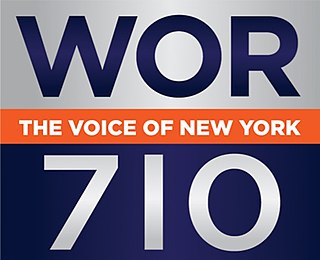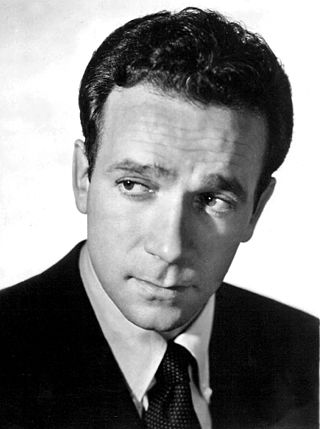Related Research Articles

The Front Page is a Broadway comedy about newspaper reporters on the police beat. Written by former Chicago reporters Ben Hecht and Charles MacArthur, it was first produced in 1928 and has been adapted for the cinema several times. The play entered the public domain in the United States in 2024.

The Mutual Broadcasting System was an American commercial radio network in operation from 1934 to 1999. In the golden age of U.S. radio drama, Mutual was best known as the original network home of The Lone Ranger and The Adventures of Superman and as the long-time radio residence of The Shadow. For many years, it was a national broadcaster for Major League Baseball, the National Football League, and Notre Dame Fighting Irish football. Mutual ran a highly regarded news service along with a variety of well-liked commentary shows from the middle of the 1930s until the network's dissolution in 1999. In the 1970s, Mutual pioneered the nationwide late night call-in talk radio program, introducing the country to Larry King and later, Jim Bohannon.

Arthur Quirk Bryan was an American actor and radio personality. He is best remembered for his longtime recurring role as well-spoken, wisecracking Dr. Gamble on the radio comedy Fibber McGee and Molly and for voicing the Warner Bros. cartoon character Elmer Fudd.

WOR is a 50,000-watt class A clear-channel AM radio station owned by iHeartMedia and licensed to New York, New York. The station airs a mix of local and syndicated talk radio shows, primarily from co-owned Premiere Networks, including The Clay Travis and Buck Sexton Show, The Sean Hannity Show, and Coast to Coast AM with George Noory. CBS Eye on the World with John Batchelor, from CBS Audio Network is heard at night. Since 2016, the station has served as the New York outlet for co-owned NBC News Radio. The station's studios are located at 125 West 55th Street in Midtown Manhattan, with its transmitter in Rutherford, New Jersey. WOR began broadcasting on Wednesday, February 22, 1922, and is one of the oldest continuously operating radio stations in the United States with a three–letter call sign, characteristic of a station dating from the 1920s. WOR is the only New York City station to have retained its original three-letter call sign, making those the oldest continuously used call letters in the New York City area.
John Hodiak was an American actor who worked in radio, stage and film.

Dane Clark was an American character actor who was known for playing, as he labeled himself, "Joe Average."

Erik Rhodes was an American film and Broadway singer and actor. He is best remembered today for appearing in two classic Hollywood musical films with the popular dancing team of Fred Astaire and Ginger Rogers: The Gay Divorcee (1934) and Top Hat (1935).

John Lund was an American film, stage, and radio actor who is probably best remembered for his role in the film A Foreign Affair (1948) and a dual role in To Each His Own (1946).

Robert Wesley Addy was an American actor of stage, television, and film.
Author Meets the Critics is an American radio and television talk show. After beginning on radio, it was also broadcast on television by the National Broadcasting Company, American Broadcasting Company, and then the DuMont Television Network.
Dream Girl is a 1945 two-act comedy by Elmer Rice, with a large cast, multiple sets, and quick pacing. It depicts a day in the life of a daydreaming bookstore manager, whose vivid fantasies form much of the play's action. The work makes great demands on the actress playing this part, as she is on stage constantly, must make costume and mood changes while jumping between sets, and delivers long soliloquies and a Shakespearean speech. According to some reviewers, her spoken lines were the longest female part known up to that time, nearly as long as Hamlet. The dream fantasies prompted comparison to the short story "The Secret Life of Walter Mitty", but critics at the time more often suggested the play Lady in the Dark as an influence.
The Chevrolet Tele-Theatre is an American anthology series that aired live on NBC Mondays at 8 pm EST from September 27, 1948 to June 26, 1950. The program presented both news headlines and live dramatic performances of either original plays or works adapted for television from the stage. Sometimes the show was referred to as Chevrolet on Broadway or The Broadway Playhouse; particularly when the program was presenting an adapted stage work from New York City's theatre scene.

Ernest Whitman was an American stage and screen actor. He was also billed in some Broadway plays as Ernest R. Whitman.
Sparkle Time was a musical radio program in the United States. It was broadcast on CBS October 4, 1946 - March 28, 1947.

Ted Steele was an American bandleader and host of several radio and television programs. He also held administrative positions at radio stations and had his own media-related businesses.

The Ford 50th Anniversary Show, also known as The American Road, was a two-hour television special that was broadcast live on June 15, 1953, from 9 p.m. to 11 p.m. Ford Motor Company purchased two hours of prime time from both NBC and CBS for an entertainment extravaganza celebrating the company's 50th anniversary. The program was presented without commercial interruption.

Life with Father is an American television sitcom that ran from 1953 to 1955. It starred Leon Ames as Clarence Day Sr. and Lurene Tuttle as his wife Lavinia. It began broadcasting in color in 1954, and was the first live color TV series for network television originating in Hollywood.
Francis J. Felton Jr. was a bandleader, vaudevillian, and host of children's television programs. He was known professionally as Happy Felton.
An Evening with Romberg is an American musical radio program that was broadcast on NBC from June 12, 1945, until August 31, 1948, as a summer replacement for other programs. Sigmund Romberg was the star, and Raleigh cigarettes was the sponsor.
Child's World is an American children's radio series that was broadcast on ABC October 26, 1947 - June 27, 1949. More than 5,000 children were interviewed on the award-winning program. A television series was adapted from it, and discussions from it formed the basis of a book.
References
- 1 2 3 Lohman, Sidney (October 6, 1946). "News and Notes from the Studios" . The New York Times. p. X 9. Retrieved September 5, 2024.
- ↑ "Barry Gray Rides Again, Feuds Notwithstanding". Variety. January 8, 1947. p. 118. Retrieved September 8, 2024.
- 1 2 3 4 Crosby, John (November 26, 1946). "Broadway Talks Back" . The Ottawa Journal. p. 21. Retrieved September 7, 2024– via Newspapers.com.
- 1 2 3 "Followup Comment". Variety. December 11, 1946. p. 32. Retrieved September 7, 2024.
- ↑ Tranter, Don (October 31, 1946). "Radio Comment, Highlights" . Buffalo Courier-Express. p. 15. Retrieved September 6, 2024– via Newspapers.com.
- 1 2 3 "'Talk Back to Drama Critics': Mgrs., Authors' radio rebuttal". Variety. September 18, 1946. pp. 1, 52. Retrieved September 5, 2024.
- 1 2 3 4 5 "Broadway Talks Back". Variety. October 16, 1946. p. 30. Retrieved September 7, 2024.
- ↑ Smith, Ronald L. (March 8, 2010). Horror Stars on Radio: The Broadcast Histories of 29 Chilling Hollywood Voices. McFarland. p. 101. ISBN 978-0-7864-5729-8 . Retrieved September 5, 2024.
- ↑ "Kreisler Visits Artists Series" . The Birmingham News. December 16, 1946. p. 3. Retrieved September 6, 2024– via Newspapers.com.
- ↑ "Sideshow of Radio Attractions" . Richmond Times Dispatch. November 10, 1946. p. D 9. Retrieved September 6, 2024– via Newspapers.com.
- ↑ "Women in Radio" (Document). Women's Bureau, United States Department of Labor. May 1947. p. 8.
- 1 2 "B'way Doesn't Talk so WOR show may exit". Variety. January 1, 1947. p. 22. Retrieved September 7, 2024.
- 1 2 3 Gould, Jack (November 3, 1946). "Listener's Notebook: Composer-Pianist" . The New York Times. p. 73. Retrieved September 7, 2024.